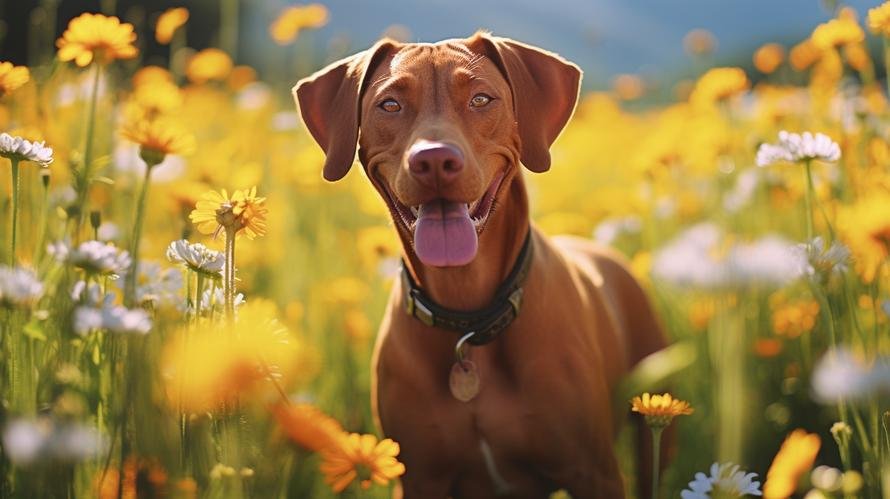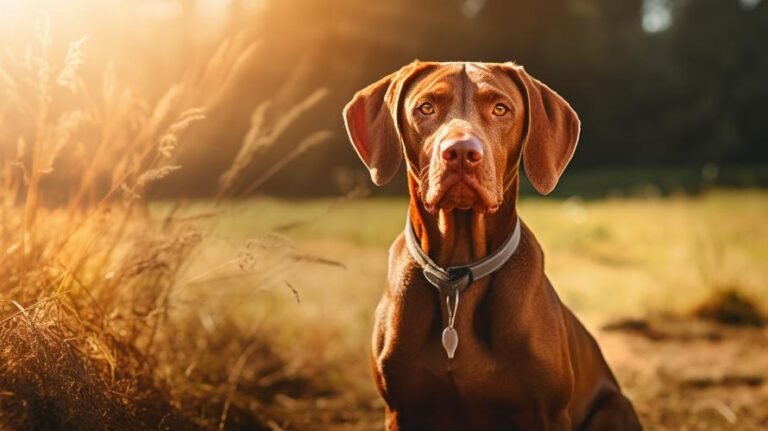You may be surprised to learn that the Vizsla, a slender yet muscular Hungarian dog breed, also known as the ‘Velcro dog,’ is celebrated for its unique ability to form tight-knit bonds with their human companions. They love nothing more than to ‘stick’ to the sides of their beloved family members. The intimate bond between a Vizsla and its human companions is so potent that separation for extended periods can trigger symptoms akin to separation anxiety in these dogs. With their glowing russet fur, intelligent eyes, and astonishing athleticism, it’s no wonder many are attracted to the idea of taking home a Vizsla. But, there’s a question that often lurks on the horizon: are Vizslas aggressive?
Before we delve into this concern, let’s dispel a common misconception- aggression is not a trait inherent to any particular breed- it’s an appalling behavioral issue that can manifest in any canine, irrespective of breed, size or age. Nevertheless, the manifestation of aggressive behaviors can often be closely tied to the dog’s upbringing, training and living conditions.
Generally speaking, Vizslas are not known to have an aggressive temperament. In fact, they are renowned for their friendly, good-natured disposition, making them wonderful family pets. They may not be as mild-mannered as perhaps the Golden Retriever or as inviting as the Labrador Retriever, but hostility is not a character trait you would typically associate with the breed. Distinguished for their lively demeanor, Vizslas are warm, affectionate and gentle dogs that adore their families.
Yet, there are some instances where a Vizsla may exhibit aggressive behavior. These exceptions, however, are not due to the breed’s inherent characteristics, but can be attributed to certain circumstances such as fear, anxiety, poor socialization, sickness or a lack of training. Thus, if such situations arise, seeking assistance from professional trainers or dog behaviorists can be of immense help to rectify these behavioral problems.
Meticulous socialization during their puppyhood is vital for Vizslas to grow into congenial, well-behaved adult dogs. Just as human children, puppies are very impressionable, and their early life experiences can significantly shape their adult behavior. Vizsla puppies who are introduced to different environments, people, and pets are less likely to display aggressive tendencies as they grow older.
Training Vizslas with kindness and positive reinforcement methods from an early age can also deter the development of aggressive behavior. Harsh punishments or dominance-based training techniques are not advisable. Not only can such methods spark fear and anxiety in your Vizsla but they could potentially fuel instances of defensive aggression.
Moreover, providing your Vizsla with mental stimulation and physical exercise is paramount. Remember, Vizslas are an active, energetic breed with a respectable lineage of hunting dogs. They need a significant amount of regular exercise to keep their bodies healthy and their minds sharp. A bored or under-stimulated Vizsla may act out by chewing, biting, or engaging in destructive behaviors, which some could misconstrue as aggression.
Diet can also play a role in your Vizsla’s behavior. While this may come as a surprise to many, the cliché ‘you are what you eat’ applies to dogs as much as it does to humans. Some studies suggest that a dog’s diet can influence their behavior. So, ensure you are feeding your Vizsla a balanced, nutritious diet to enhance their physical health and mental well-being.
What then, if your Vizsla still exhibits signs of aggression? It might be prudent to consult with your veterinarian. Your Vizsla could be suffering from a health issue causing them discomfort or pain, making them unusually irritable or aggressive.
In conclusion, the Vizsla, beloved for its loyal, affectionate demeanor, is not typically aggressive. Nevertheless, neglecting their emotional, physical or nutritional needs can culminate in undesirable behaviors that seem aggressive. Therefore, a mindful approach to raising your Vizsla, complete with proper socialization, training, exercise, diet, and regular vet check-ups, can assure that your Vizsla grows into a well-adjusted, non-aggressive and loving companion. It’s a commitment surely, but the reward of sharing your life with this warm, affectionate, and vibrant breed certainly outweighs the challenges.



